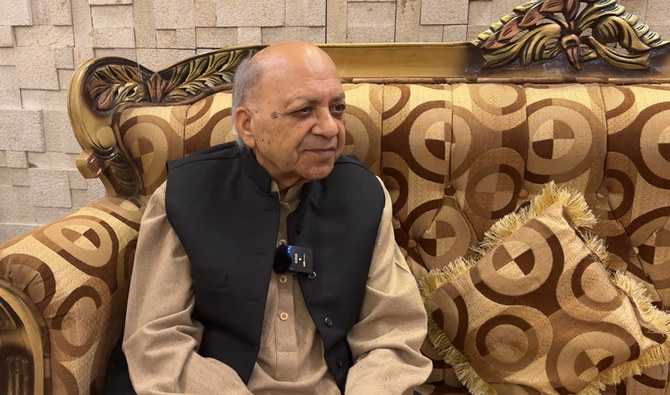ISLAMABAD: Abdul Qayyum’s family was among millions who abandoned their homes in India in 1947 to migrate to Pakistan, a newly created nation cleaved out of British colonial India for the Muslims of the subcontinent.
The journey was an arduous one, with Qayyum and his family arriving in Pakistan with nothing but the clothes on their backs, the octogenarian told Arab News ahead of Pakistan Day on March 23, celebrated each year as the day the Lahore Resolution was adopted, calling for the creation of an independent sovereign state for Muslims.
Chaos, confusion and violence engulfed the subcontinent from June to August 1947 when the British announced they were dividing the subcontinent into India and Pakistan. The event triggered one of the largest displacements in history, with close to 15 million Hindus and Muslims rushing in opposite directions to new homelands and around two million people killed in the violence that ensued after the announcement to divide the subcontinent was made in June 1947.
Dreading the violence in which neighbors slaughtered neighbors and childhood friends turned on one another to become sworn enemies, Qayyum, now 86, remembered when his family made the decision that June to leave their house in the village of Noor Mahal in India’s Punjab state and migrate to Pakistan’s Lyallpur. The city is now called Faisalabad, the industrial center of the Pakistani province of Punjab and the country’s third largest and populous city.
Qayyum was eight years old then and left for a refugee camp as part of a convoy, accompanied by his mother, father and sister, for the newly created Muslim state of Pakistan.
“When the announcement of Pakistan’s birth happened [in June 1947], the riots began immediately and then people started packing up whatever things they had in their houses,” Qayyum told Arab News in an interview this week.
The family also managed to quickly pack some clothes and jewelry that Qayyum’s mother owned, before bolting for a camp for migrants in Tehsil Nakozil in India. An official advised them against carrying their belongings on foot, offering to take their suitcase to the camp.
“Then he came back and said he was looted on the way and said, ‘Now I have nothing left’,” Qayyum said, smiling. “So, believe me when we entered Pakistan, I had a kurta, shalwar and sandals on me. Same with my father and my mother and sister were also in their clothes only.”
More suffering awaited the family, who lived at the refugee camp for the next two months.
“We spent a miserable time there as the rains started, it was the rainy season. There was a lot of difficulty, there was no roof so we propped up sheets on wood and made a makeshift tent and lived there.”
After braving two months at the camp, Qayyum and his family boarded a train at Nakodar station, approximately 12 miles from Jalandhar, for their journey to Pakistan.
With hundreds of migrants to cater to, women and children were accommodate in the train’s compartments while the men were put on the roof. Those in the compartments were told to keep the windows shut as the dangerous journey progressed slowly, with passengers eating only roasted gram and jaggery to survive.
“The train would stop often along the way. If it had gone in one go it would have been a few-hours-long journey. But night fell. Then in the morning we crossed the border [of India into Pakistan],” Qayyum remembered.
The train arrived in Pakistan in late August or September 1947, Qayyum, who on account of his old age could not remember the exact date, said.
“We crossed into Pakistan through the Wagah border, reaching Lahore amid loud celebrations.”
“HIGH HOPES”
From there the family left for present-day Faisalabad, where Qayyum’s father had previously worked at the Lyallpur Cotton Mill till 1946, leaving the city that year to start a business in Calcutta.
Qayyum’s father got his old job back and managed to secure a house from the government. Migrants who provided evidence they had left behind property in India were given lands and properties by Pakistan’s government during the early years of partition.
Qayyum went on to become an engineer and joined the Capital Development Authority (CDA) in 1965, a public company responsible for providing municipal services in Islamabad.
“I was part of a dedicated team tasked with constructing key landmarks such as the President’s House and secretariat, as well as various roads and bridges across different sectors,” he said.
Though Qayyum said he did not regret moving to Pakistan, he recalled with sadness the year of 1971, when then East Pakistan, now Bangladesh, won independence from Pakistan after a nine-month war, helped by India.
“It was a significant loss considering the immense contributions made by the people of East Pakistan to the creation of Pakistan,” Qayyum said.
Moreover, he lamented that Pakistan as a country had not been able to achieve its true goal of becoming a democratic nation for the subcontinent’s Muslims.
“The goal for which Pakistan was created, Pakistan got made but that goal could not be fulfilled. The vision that Quaid e Azam [Pakistan’s founder Muhammad Ali Jinnah] had, it [Pakistan] wasn’t made according to that.”
But the octogenarian still has high hopes from the younger generation and its ability to fight to change a system he does not believe had ever been truly democratic.
“There is a lot of hope attached with the next generation because times have changed. The old forms of [so-called] democracy will not remain and god willing a better time will come.”












